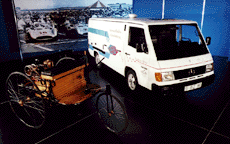January 19, 1995
The Daimler-Benz Group presented Europe's first vehicle equipped with a fuel cell at the "Alternative Mobility" expo in Karlsruhe from January 19 - 22. After more than 50 years of searching all over the world for methods to produce electric current directly from oil, gas or renewable resources, Daimler-Benz is convinced that it has solved all of the fundamental problems of such a revolutionary propulsion system.The fuel cell presented by the Daimler-Benz researchers, which currently only runs on hydrogen gas but will later also run on methanol, converts energy significantly more efficiently than any other technology previously used for automobiles. It permits the use of easy-to-regulate electric motors in automobiles without the burden of having to transport heavy batteries. At a comparable output level, the methanol-powered fuel cell produces significantly less carbon dioxide and no pollutants. The exhaust expels only chemically pure water.
For Edzard Reuter, Chairman of the Management Board of Daimler-Benz AG, this technological breakthrough is not only of tremendous importance to the automobile - for which it represents a "milestone on the road to ecological mobility" - but for the entire power generation and distribution industry.
Like many companies and institutions throughout the world, Daimler-Benz has included fuel cell technology in its research for years. The Group gained practical experience during the construction of an entirely different type of fuel cell, which is indispensable for the production of energy in the space travel sector. After the expansion of the Group, the activities previously scattered over AEG, Dornier and MBB were consolidated in the Research Department under the direction of Prof. Dr. Hartmut Weule, international cooperation was sought and the research divisions were provided with the necessary capacities. By so doing, the Group was able to secure the know-how of Ballard, the leading Canadian research institute, before American competitors realized the significance of the fuel cell drive system.
Proof of the capability of German researchersFor Prof. Dr. Weule, the introduction of Europe's first fuel cell vehicle is proof that "when working in a team, in consensus and appropriately oriented towards a goal, German researchers can do outstanding work, which can also quickly lead to implementation in products." Weule added, "With such goal-oriented methods as those we introduced in the Group and in international cooperation for the fuel cell, Germany and Europe can regain world leadership in technological progress. Because of our current structural crisis, more and more people recognize that only technological progress is capable of preserving jobs and prosperity."
Fuel cell vehicle is still experimentalThe Daimler-Benz fuel cell vehicle is still an experimental vehicle. The MB 100-Transporter is loaded with technology which strongly reminds one of a power plant. In just three years, however, this power plant is expected to be miniaturized to the point where it can be installed in a "Vision A'93".
However, Dr. Weule warned against believing that the fuel cell drive system will be able to replace the internal combustion engine in the near future: "We are at the start of a new technological phase, comparable to the time when Gottlieb Daimler and Karl Benz produced their first automobiles."

Back to the News archive















